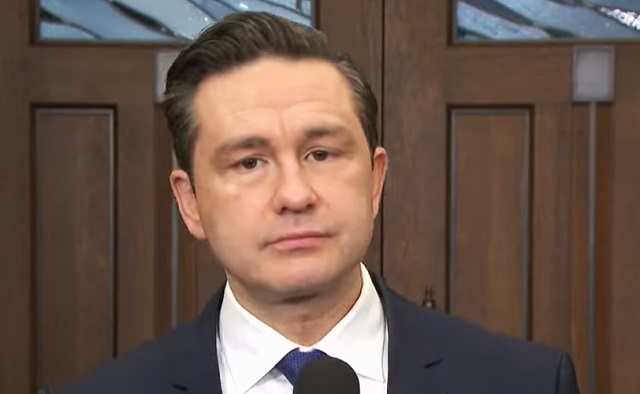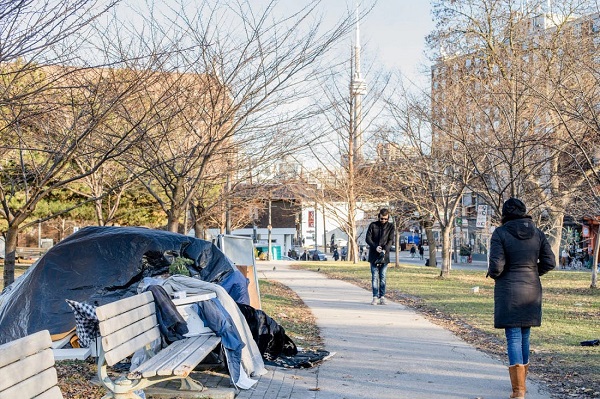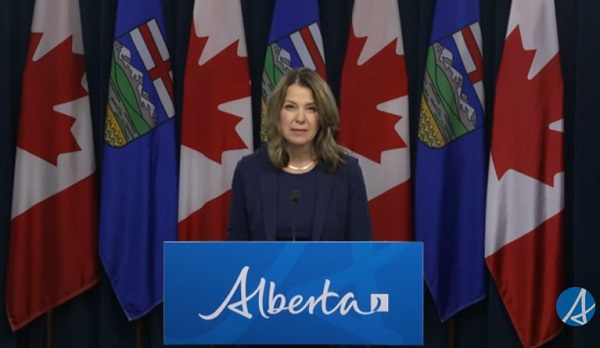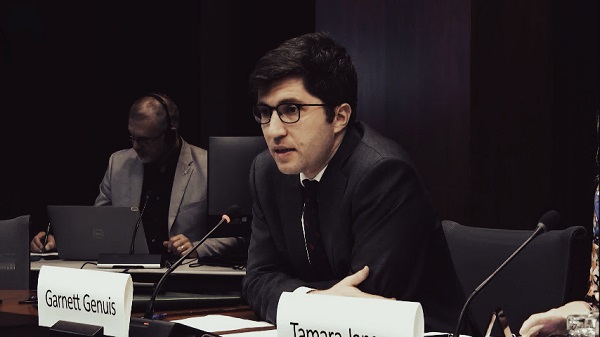Addictions
‘Drug dens’: Poilievre calls out Trudeau’s misleadingly named ‘safe’ injection sites

From LifeSiteNews
Pierre Poilievre haș again sounded off on the Trudeau government’s ‘safe’ injection sites and other drug measures, policies which have been followed by an uptick in drug overdoses wherever implemented.
Conservative Party leader Pierre Poilievre has condemned Prime Minister Justin Trudeau’s Liberal government and the mainstream media for concealing the failure of federally-subsidized “safe” injection sites for hard drug use.
During a July 12 press conference in Montreal, Quebec, Poilievre slammed politicians and mainstream media alike for masking the failure of the Trudeau government-led “supervised injection sites,” pointing out the misleading nature of the term “safe” often used when discussing these facilities, which allow addicts to abuse themselves by injecting deadly narcotics such as heroin.
“I know wacko politicians in the Liberals and the NDP [New Democratic Party] and their supporters in the media want to make it sound like there’s a constitutional obligation that we allow these drug dens anywhere they want to go up,” said Poilievre. “That is not true. That is the opposite of true.”
Poilievre’s remarks were delivered in a kindergarten playground near Montreal’s first federally-subsidized injection site that opened on April 15.
Poilievre promised that “there will not be a single taxpayer dollar from a Poilievre government going to drug dens.”
“Every single penny will go to treatment and recovery services to bring our loved ones home drug-free,” he added.
Poilievre further called out mainstream media reporters for repeating Trudeau’s claim that the drug sites are “safe” or “supervised.”
“What will you do around safe injection sites across the country?” Globe & Mail reporter Eric Andrew-Gee questioned.
“They are not safe injection sites, I’m sorry,” Poilievre responded, explaining that those terms are “dishonest language.”
“You guys repeat the same language you get from the radical Liberal-NDP activists and bureaucracy,” said Poilievre. “You call them safe. How can they be safe? Do you think it’s safe when a bullet comes flying out of one these sites to kill a mother in Toronto? Do you think that’s safe? Do you think it’s safe to have people using crack and heroin and cocaine next to a playground like this? Do you think that is safe? It’s not safe.”
Poilievre’s mention of the Toronto mother is a reference to the 2023 shooting death of Karolina Huebner-Makurat, a 44-year-old mother of two. Police allege Huebner-Makurat was killed by a stray bullet fired by a man in a drug-related dispute with another man outside of an injection site in the city’s Leslieville neighborhood.
In addition to injection sites, the Trudeau government has also been involved in the distribution of drugs to addicts. In fact, Health Canada recently noted that the Trudeau government has budgeted over $27 million in funding for “safe supply” drug programs that have been linked to increased violence and overdose deaths across Canada.
“Safe supply” is the term used to refer to government-prescribed drugs given to addicts under the assumption that a more controlled batch of narcotics reduces the risk of overdose. Critics of the policy argue that giving addicts drugs only enables their behavior, puts the public at risk, disincentivizes recovery from addiction and has not reduced – and sometimes even increased – overdose deaths when implemented.
The best example of the Trudeau government’s drug policy failures come from the province of British Columbia. Starting in 2023, the Trudeau government decriminalized the possession of up to 2.5 grams of hard drugs without criminal penalty.
Shortly thereafter, record numbers of overdose deaths and similar incidents occurred, leading to the province itself requesting that the Trudeau government recriminalize drugs in public spaces.
Nearly two weeks later, the Trudeau government announced it would “immediately” end the allowance of hard drug use in public, which critics see as tacit admission the policy was a disaster.
The effects of decriminalizing hard drugs have been the source of contention throughout the country, as evidenced in Aaron Gunn’s documentary, Canada is Dying, and in U.K. Telegraph journalist Steven Edginton’s mini-documentary, Canada’s Woke Nightmare: A Warning to the West.
Gunn, who has since become a Conservative Party candidate, previously noted that his film shows clearly the “general societal chaos and explosion of drug use in every major Canadian city” since lax policies were implemented.
“Overdose deaths are up 1,000 percent in the last 10 years,” he said in his film, adding that “every day in Vancouver four people are randomly attacked.”
Addictions
BC premier admits decriminalizing drugs was ‘not the right policy’

From LifeSiteNews
Premier David Eby acknowledged that British Columbia’s liberal policy on hard drugs ‘became was a permissive structure that … resulted in really unhappy consequences.’
The Premier of Canada’s most drug-permissive province admitted that allowing the decriminalization of hard drugs in British Columbia via a federal pilot program was a mistake.
Speaking at a luncheon organized by the Urban Development Institute last week in Vancouver, British Columbia, Premier David Eby said, “I was wrong … it was not the right policy.”
Eby said that allowing hard drug users not to be fined for possession was “not the right policy.
“What it became was a permissive structure that … resulted in really unhappy consequences,” he noted, as captured by Western Standard’s Jarryd Jäger.
LifeSiteNews reported that the British Columbia government decided to stop a so-called “safe supply” free drug program in light of a report revealing many of the hard drugs distributed via pharmacies were resold on the black market.
Last year, the Liberal government was forced to end a three-year drug decriminalizing experiment, the brainchild of former Prime Minister Justin Trudeau’s government, in British Columbia that allowed people to have small amounts of cocaine and other hard drugs. However, public complaints about social disorder went through the roof during the experiment.
This is not the first time that Eby has admitted he was wrong.
Trudeau’s loose drug initiatives were deemed such a disaster in British Columbia that Eby’s government asked Trudeau to re-criminalize narcotic use in public spaces, a request that was granted.
Records show that the Liberal government has spent approximately $820 million from 2017 to 2022 on its Canadian Drugs and Substances Strategy. However, even Canada’s own Department of Health in a 2023 report admitted that the Liberals’ drug program only had “minimal” results.
Official figures show that overdoses went up during the decriminalization trial, with 3,313 deaths over 15 months, compared with 2,843 in the same time frame before drugs were temporarily legalized.
Addictions
Canada must make public order a priority again

A Toronto park
Public disorder has cities crying out for help. The solution cannot simply be to expand our public institutions’ crisis services
[This editorial was originally published by Canadian Affairs and has been republished with permission]
This week, Canada’s largest public transit system, the Toronto Transit Commission, announced it would be stationing crisis worker teams directly on subway platforms to improve public safety.
Last week, Canada’s largest library, the Toronto Public Library, announced it would be increasing the number of branches that offer crisis and social support services. This builds on a 2023 pilot project between the library and Toronto’s Gerstein Crisis Centre to service people experiencing mental health, substance abuse and other issues.
The move “only made sense,” Amanda French, the manager of social development at Toronto Public Library, told CBC.
Does it, though?
Over the past decade, public institutions — our libraries, parks, transit systems, hospitals and city centres — have steadily increased the resources they devote to servicing the homeless, mentally ill and drug addicted. In many cases, this has come at the expense of serving the groups these spaces were intended to serve.
For some communities, it is all becoming too much.
Recently, some cities have taken the extraordinary step of calling states of emergency over the public disorder in their communities. This September, both Barrie, Ont. and Smithers, B.C. did so, citing the public disorder caused by open drug use, encampments, theft and violence.
In June, Williams Lake, B.C., did the same. It was planning to “bring in an 11 p.m. curfew and was exploring involuntary detention when the province directed an expert task force to enter the city,” The Globe and Mail reported last week.
These cries for help — which Canadian Affairs has also reported on in Toronto, Ottawa and Nanaimo — must be taken seriously. The solution cannot simply be more of the same — to further expand public institutions’ crisis services while neglecting their core purposes and clientele.
Canada must make public order a priority again.
Without public order, Canadians will increasingly cease to patronize the public institutions that make communities welcoming and vibrant. Businesses will increasingly close up shop in city centres. This will accelerate community decline, creating a vicious downward spiral.
We do not pretend to have the answers for how best to restore public order while also addressing the very real needs of individuals struggling with homelessness, mental illness and addiction.
But we can offer a few observations.
First, Canadians must be willing to critically examine our policies.
Harm-reduction policies — which correlate with the rise of public disorder — should be at the top of the list.
The aim of these policies is to reduce the harms associated with drug use, such as overdose or infection. They were intended to be introduced alongside investments in other social supports, such as recovery.
But unlike Portugal, which prioritized treatment alongside harm reduction, Canada failed to make these investments. For this and other reasons, many experts now say our harm-reduction policies are not working.
“Many of my addiction medicine colleagues have stopped prescribing ‘safe supply’ hydromorphone to their patients because of the high rates of diversion … and lack of efficacy in stabilizing the substance use disorder (sometimes worsening it),” Dr. Launette Rieb, a clinical associate professor at the University of British Columbia and addiction medicine specialist recently told Canadian Affairs.
Yet, despite such damning claims, some Canadians remain closed to the possibility that these policies may need to change. Worse, some foster a climate that penalizes dissent.
“Many doctors who initially supported ‘safe supply’ no longer provide it but do not wish to talk about it publicly for fear of reprisals,” Rieb said.
Second, Canadians must look abroad — well beyond the United States — for policy alternatives.
As The Globe and Mail reported in August, Canada and the U.S. have been far harder hit by the drug crisis than European countries.
The article points to a host of potential factors, spanning everything from doctors’ prescribing practices to drug trade flows to drug laws and enforcement.
For example, unlike Canada, most of Europe has not legalized cannabis, the article says. European countries also enforce their drug laws more rigorously.
“According to the UN, Europe arrests, prosecutes and convicts people for drug-related offences at a much higher rate than that of the Americas,” it says.
Addiction treatment rates also vary.
“According to the latest data from the UN, 28 per cent of people with drug use disorders in Europe received treatment. In contrast, only 9 per cent of those with drug use disorders in the Americas received treatment.”
And then there is harm reduction. No other country went “whole hog” on harm reduction the way Canada did, one professor told The Globe.
If we want public order, we should look to the countries that are orderly and identify what makes them different — in a good way.
There is no shame in copying good policies. There should be shame in sticking with failed ones due to ideology.
Our content is always free – but if you want to help us commission more high-quality journalism,
consider getting a voluntary paid subscription.
-

 Business1 day ago
Business1 day ago$15B and No Guarantees? Stellantis Deal explained by former Conservative Shadow Minister of Innovation, Science and Technology
-

 Alberta21 hours ago
Alberta21 hours agoPremier Smith moves to protect Alberta in International Agreements
-

 Business16 hours ago
Business16 hours agoLiberals backtrack on bill banning large cash gifts, allowing police to search Canadians’ mail
-

 Agriculture1 day ago
Agriculture1 day agoFrom Underdog to Top Broodmare
-

 Health16 hours ago
Health16 hours agoFor Anyone Planning on Getting or Mandating Others to Get an Influenza Vaccine (Flu Shot)
-

 Sports15 hours ago
Sports15 hours ago‘We Follow The Money’: Kash Patel Says Alleged NBA Ties To Mafia Just ‘The Start’ Of FBI Investigation
-

 Alberta2 days ago
Alberta2 days agoAlberta’s licence plate vote is down to four
-

 Bruce Dowbiggin2 days ago
Bruce Dowbiggin2 days agoIs The Latest Tiger Woods’ Injury Also A Death Knell For PGA Champions Golf?





